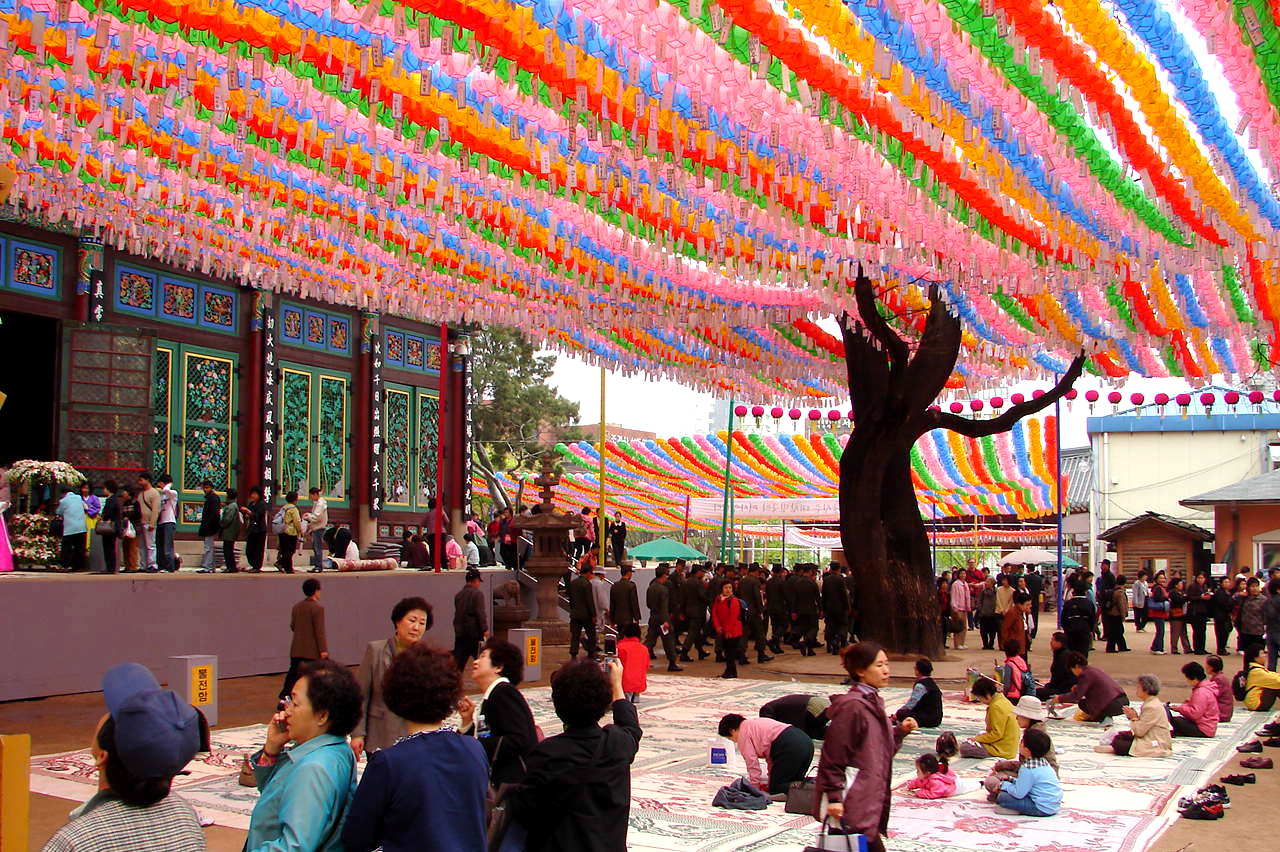We interview “T.K” (“The Korean”) Park of the Ask a Korean blog about Korea, Tourism, Activism & why American media so often speaks over rather than dialogue with Asia. Read the interview below then come check our other (podcast) interviews and our tours in Asia here!
Asia Art Tours: Why did you start the blog Ask a Korean? And why have you continued to field questions?
TK of Ask a Korean – Truth: I was bored during graduate school, and Gustavo Arellano (who is now a columnist with the LA Times) used to run a column called Ask a Mexican, which I really loved. I keep writing because Korea remains interesting, and lots of people still send me questions.
AAT: When we say “Korean”, how should we consider that term? (What complexities in Korea
identity or history that make a term like “Korean” complicated?)
TK: My very first post on AAK! was how Korea was becoming more multicultural. Being a “Korean” previously was an all encompassing term, of where you are from, what ethnicity you are, what language you speak, what food you eat, etc. But we are approaching a tipping point where all those questions will have to be reconsidered, and determine which truly belongs to the scope of being “Korean” and which does not.
AAT: Likewise, Korea is a capitalist society, but has a very unique history within its capitalism. Its too long for one question, I’m wondering if you could pull out what (if any) historical conflicts between capitalists, the state and laborers are still being struggled over in Korea?
TK: South Korea developed as a developmental dictatorship, such that the state closely collaborated with the corporations. This meant being in a labor union was not just anti-capitalist, it was also anti-state, and was treated accordingly. The story of South Korea’s democratization is in a significant part the story of labor unions defeating the corporatist state.
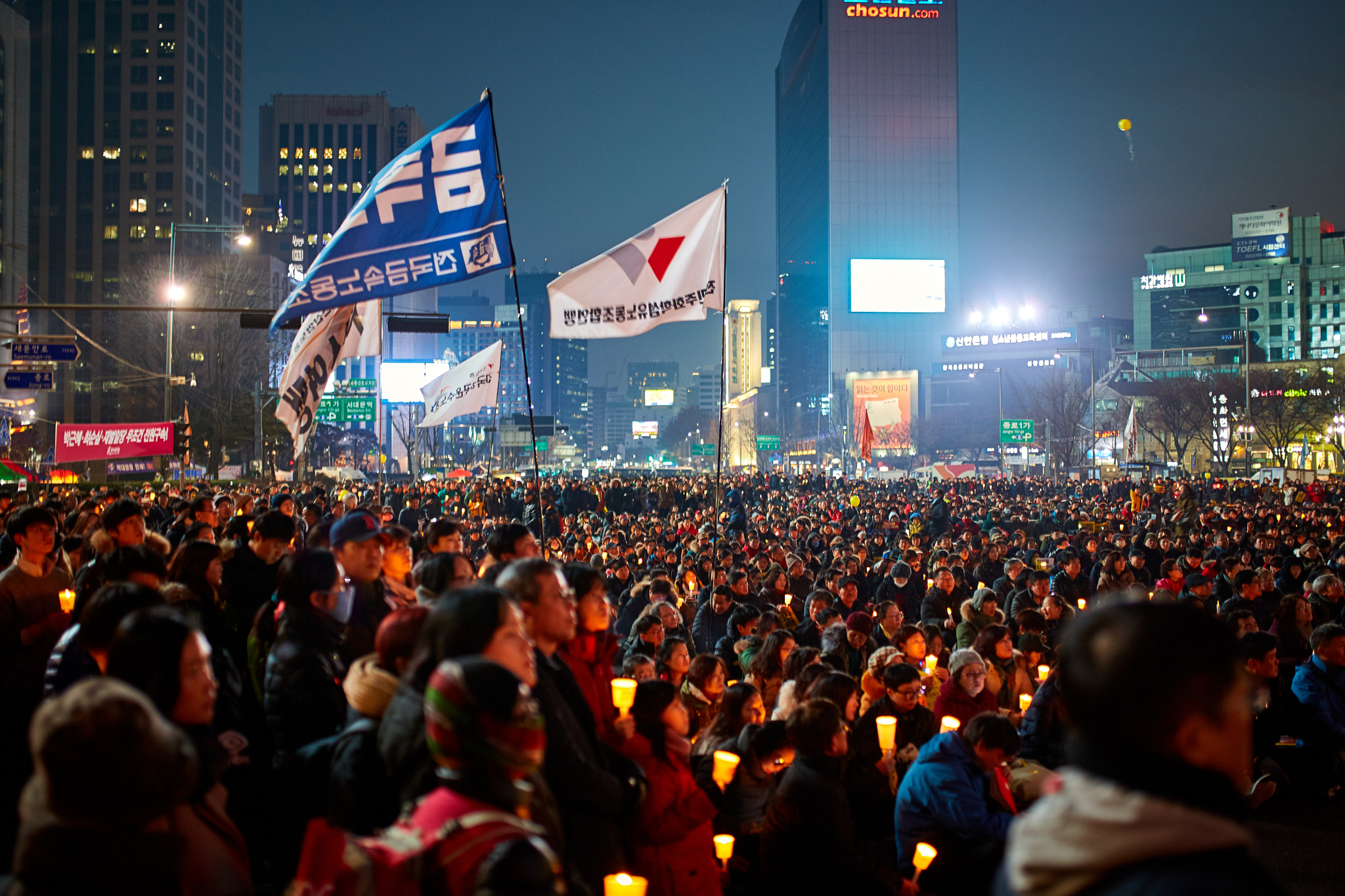
(Protests against former president Park Geun-hye )
AAT: Much has been written recently on “Performative Workaholism” in capitalism. That it’s not enough to work hard, you have constantly be demonstrating how hard you’re working and how much you love work. Does this exist? Is there a growing awareness (or even dissatisfaction) that the “Korean Dream” is no longer able to provide for this generation (and the next) and that working hard (and showing how much you love work) is not so much a stairway as it is a hamster wheel)?
TK: There is certainly the case of restlessness among the young. This was a great article on this point. https://foreignpolicy.com/2019/07/04/why-young-koreans-love-to-splurge-shibal-biyong-millennial-fuck-it-expense/
I think we are in the final stages of the “extremely rarefied rat race,” where the rat race is still the mainstream but there is a budding trend for the youth to scale back and look for small satisfactions.
AAT: I work in the Travel Industry and I like that tourism helps people connect to different cultures… but, I often see Tourism simply as capitalism monetizing relations and spaces that formerly were based on tradition, trust, or community.
Within Korea, how have you seen tourism be a force for the better? As well as… for the worse?
TK: Because Korea has been a closed country for so long, I think just being regularly exposed to people who do not look like you have been a good thing. I spend a lot of time near the Gyeongbokgung area when I visit Korea because of my work, and the number of international tourists is mind-blowing to me now.
For worse – it wasn’t great that Korea’s tourism industry became highly dependent on China, such that China could use travel ban as an informal economic sanction against Korea for political reasons. But that’s getting pretty granular. I think tourism to Korea generally has been a good thing.
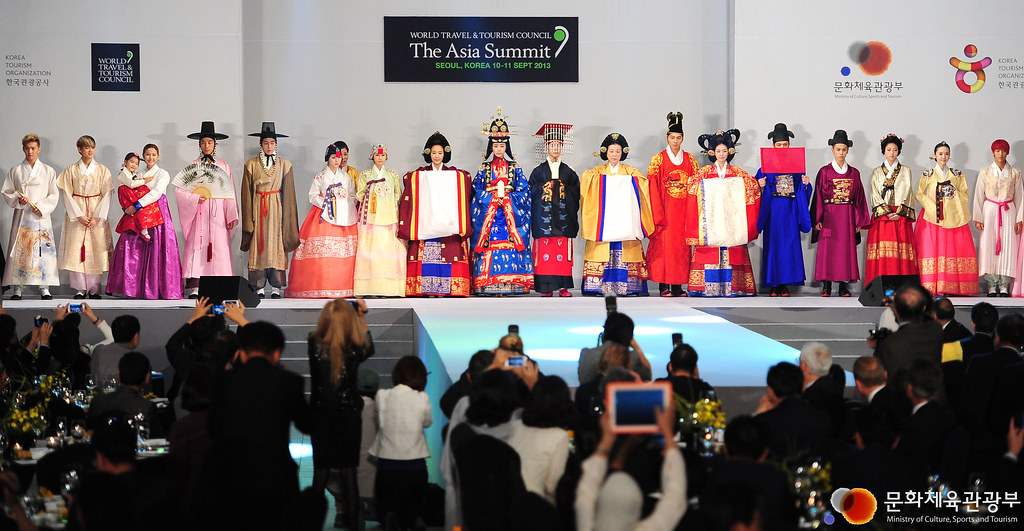
AAT: My understanding of K-Pop being a cultural force is (partially) representative of how dominant Chaebol are within Korean Society, as well as how the Korean State sees K-pop as a Product. . . not something that’s born or grows naturally within a society but something that’s manufactured.
Could you discuss your own thoughts on K-Pop, and how it should be viewed in relation to society-Capitalism/Chaebol-and the state (is it a product? Is it part of culture? Would it exist without Chaebol?)
TK: K-pop might be one of the few aspects of Korea that’s not touched by chaebol! You are entirely correct that K-pop as a cultural force has a lot to do with treating it as a product to be packaged and exported overseas, like cars and electronics. But it was not the chaebols that made that process happen.
There is a great deal of talk about how the Korean state created K-pop, but I think that talking point is, while not untrue, way overblown. Yes, the Korean government provided some help, as it does today now too. But K-pop is a natural outgrowth of Korea’s pop culture, which grew under the influence of US pop culture.
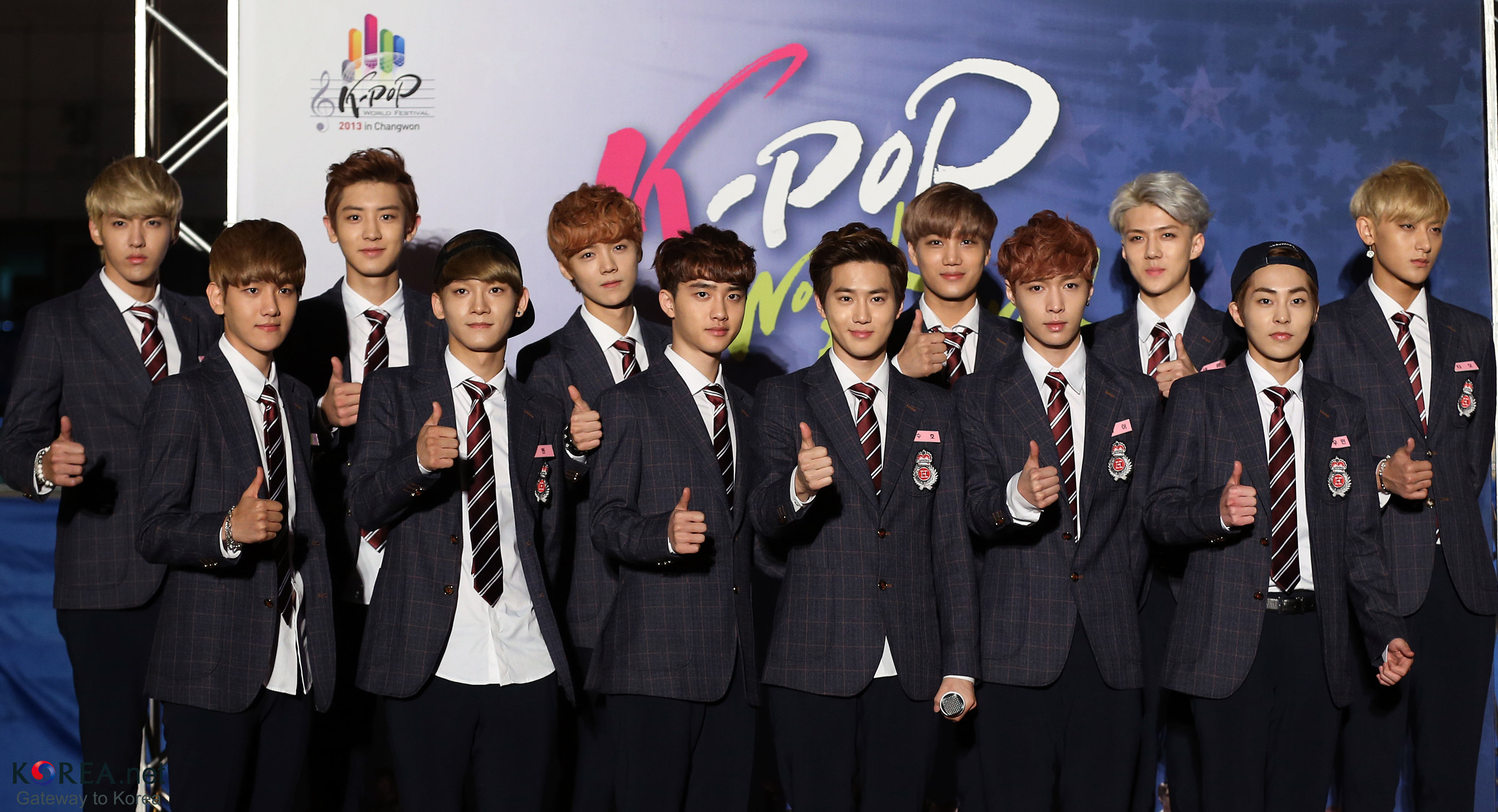
AAT: I’d like to use the piece you wrote recently in The Nation as a jumping off point. Without getting into the unabridged history, I’m wondering what you can tell us about protests in Korea. What is “unique” about protests in Korea? What have been (or was) the biggest victory for protests in Korea?
TK: It’s huge, peaceful and extremely well organized. It’s an amazing display of collective intelligence and discipline.
Every major turning point in modern South Korea involved a protest. South Korea had three dictators, and two of them fell through massive protests. When it faced an authoritarian threat back in 2016, another round of massive protests led to the impeachment. It’s hard to pick a biggest victory; it would be like picking the baseball bat as the National League MVP.
AAT: what lessons (if any) can activists take from the tactics of Korean Protests (or Korean Activists)?
Organize and be persistent. Exercise discipline in order to make your movement broader and inclusive. Make it a festival rather than a riot – sing, dance and chant, and try not to break things if it can be helped.
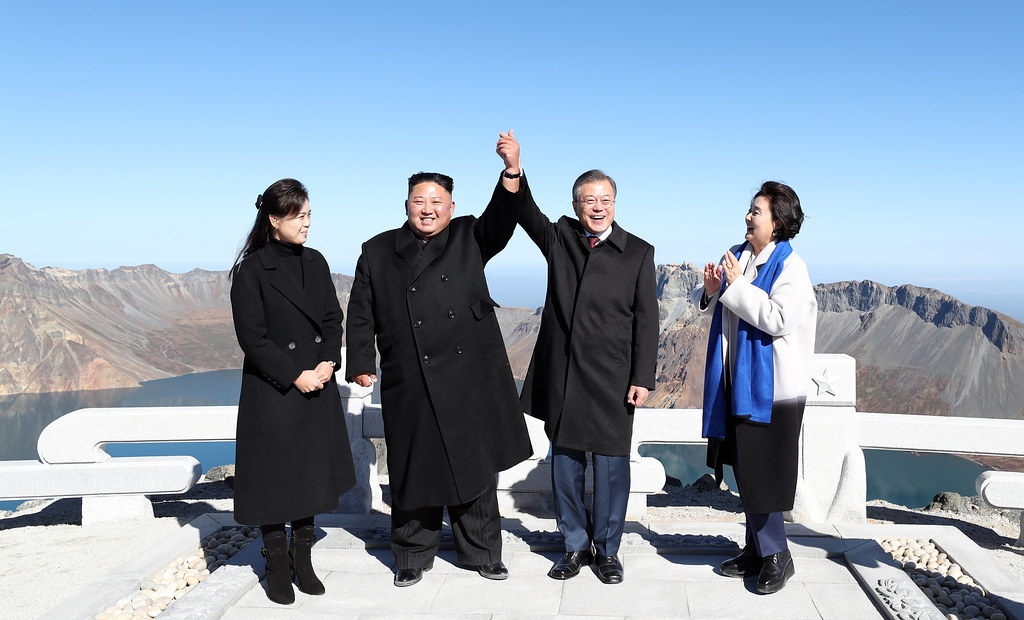
(Kim Jong Un and Moon Jae-in meeting at Korea’s sacred Mount Paektu)
AAT: Lastly, the big news has obviously been the flickering of hope that peace may be reached between North and South Korea.
Yet every time I watch main-stream media… I see white (American) generals, white (American) politicians and white (American) newspaper columnists discussing what’s “Good for Korea” or how South Korea “shouldn’t negotiate with terrorists like Kim Jong-un”.
So I’d like to “Ask a Korean”? What do you think of the peace negotiations and the idea of Peace between North and South Korea? And … why do you think so few American media organizations “Ask a Korean”? (you or any other Korean!) When it comes to this question?
TK: This is what I wrote last year, and I think it still holds true: http://askakorean.blogspot.com/2018/06/this-time-will-be-different.html
Because that’s what Americans do 🙂 Being an American means never having to say sorry, or consider the possibility that there are people who hold bigger stakes than you do.

